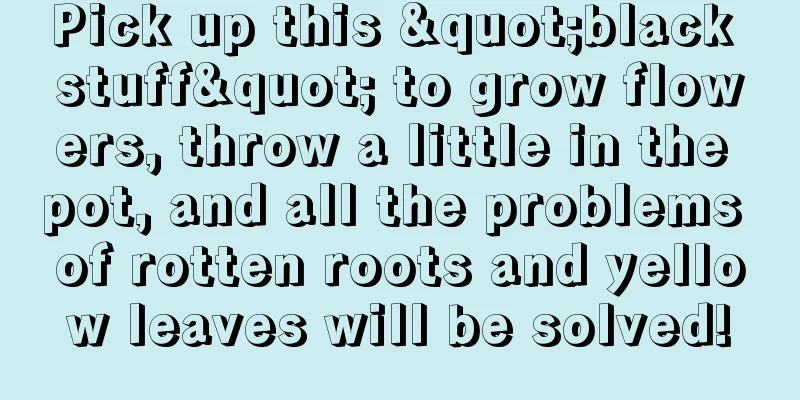Pick up this "black stuff" to grow flowers, throw a little in the pot, and all the problems of rotten roots and yellow leaves will be solved!

|
Generally speaking, when flower plants have yellow leaves and rotten roots, it is mostly because of problems in maintenance methods, and lack of nutrients is the main reason. After all, plants and flowers need sufficient nutrients to ensure their growth during the growth process, but the nutrients in the soil are limited. At this time, we need to use some small things to help the plants add nutrients and resume growth. In fact, if there is a lack of nutrients during the flower-growing process, we don’t necessarily have to buy flower fertilizers to help supplement nutrition. Sometimes some small items in life may seem insignificant, but they can play a big role in growing flowers, just like these "black things" that Huahua knows. Usually no one wants them on the roadside. Picking some up and taking them home to grow flowers is no worse than flower fertilizer! Willow barkNow it is winter, and many trees are beginning to shed their leaves and bark, and willow trees are naturally among them. At this time, we can collect some willow bark and take it home as a backup for growing flowers. Willow is a plant that can survive as long as it comes in contact with water. This is entirely because it contains a relatively rich amount of salicylic acid, which can accelerate cell division and thus promote growth. Similarly, we can achieve the same effect by using willow bark to grow flowers. Directions:We cannot use willow bark directly. It needs to be sterilized at high temperature to avoid problems in the future. We first soak the collected willow bark in boiling water for a few hours, and then take it out and mix it with the soil to enhance nutrients and looseness, or directly place it at the bottom of the flowerpot as base fertilizer. It is a good choice. In this way, the nutrients in it will slowly evaporate, which will naturally help the plant increase its growth rate. The second type: pine needlesHuahua just said that trees shed their leaves in winter, and pine needles are also common sights on the roadside at this time. Although these tiny pine needles may seem insignificant, because they are hard in texture and belong to the pine family, they can be used to help grow flowers, not only enhancing soil permeability but also providing nutrients. Directions:Because pine needles are collected outdoors, they naturally cannot be used directly. They need to be exposed to the sun for a period of time to completely remove the impurities and bacteria inside. They can then be mixed with soil to make pine needle soil, or they can be spread on the surface or bottom of the soil in the flowerpot to improve drainage and help growth. These two inconspicuous black things may not seem to have much use, but they are just right for growing flowers. Have you all learned today’s little method of growing flowers? |
Recommend
Mosquito repellent plant likes shade or sunlight
Does mosquito repellent grass prefer shade or sun...
Can lychees be grown in the north?
Can lychees be grown in the north? Lychees can be...
What to do if the water-grown Spathiphyllum turns black
1. Change water in time If the water of Spathiphy...
Will the red sage die in winter? Will it bloom in winter?
1. Will winter kill you? It is a plant that is ve...
Purple cabbage planting time and method
Purple cabbage planting time Purple cabbage is ge...
Is the sweet-scented osmanthus tree suitable for planting in the north?
1. Is it suitable? Osmanthus trees can be planted...
How to repair the roots of the Liuli Palace
Does the Glass Palace need root repair? The Liuli...
Where do mung bean seeds come from?
Where do mung bean seeds come from? Mung bean is ...
The difference between dahlia and dahlia
Plant appearance Dahlia Also known as dahlia, Ind...
Potted daffodil cultivation methods and techniques (soil cultivation and cultivation methods of daffodils)
Everyone has seen daffodils. It is a very common ...
How often should I water the crabapple? Does it need to be watered every day?
How often should you water the crabapple flowers?...
How to grow African jasmine in autumn
1. Watering It is still in the growing season in ...
What flowers should I send to my patients?
1. Elegant color and smell Visiting a patient and...
Where to plant a pomegranate tree in the yard? How to plant it?
1. The location of the plant in the yard When pla...
Maintenance methods of potted apricot flowers
Selection of apricot flower varieties If you want...









